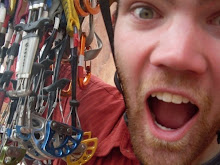As an experiential educator there are lofty, unattainable goals set forth. One that I have been toying with for sometime now is that of contrived experiences. More specifically, how to facilitate towards an intended outcome, yet not manipulate the experience to achieve said outcomes. Confused? Perhaps put into terms of a dialectic, will presents a more understandable notion.
On one end of the dialectic, an educator takes their students into the wilderness and waits to see what will happen. As the experience unfolds they patiently intervene only when needed. Perhaps as the experience begins to reach an end there is an outcome that is identified, but, the experience my turn out to simply be a walk in the woods.
On the other end, and educator has designed an experience to meet specific outcomes. As the experience begins goals and objectives are laid forth. Each part of the experience is used towards obtaining the ultimate outcome.
In either case, there is a need for a middle ground. Wherein the educator sits back and allows the experience to truly take place. And at times the educator does not intervene only till it is absolutely necessary. There is no right or wrong, rather there is a time and place for each approach taken along such a dialectic - and it is by experience that an experiential educator can effectively facilitate in such a way that is appropriate.







